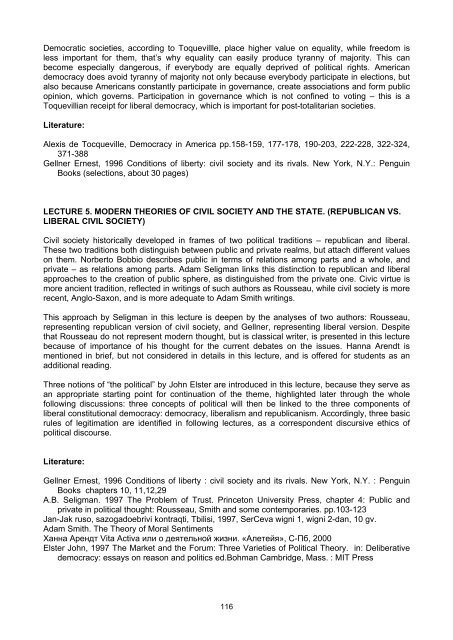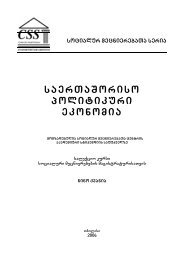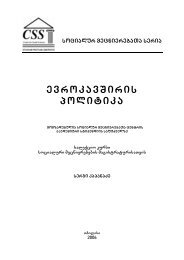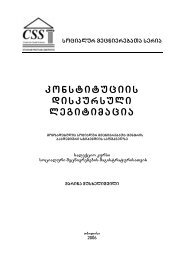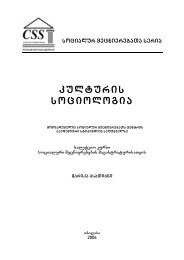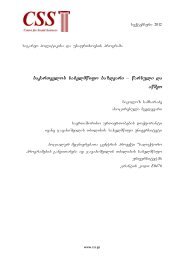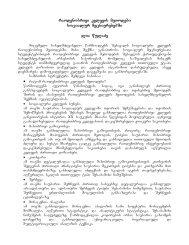samoqalaqo sazogadoeba - Center for Social Sciences
samoqalaqo sazogadoeba - Center for Social Sciences
samoqalaqo sazogadoeba - Center for Social Sciences
You also want an ePaper? Increase the reach of your titles
YUMPU automatically turns print PDFs into web optimized ePapers that Google loves.
Democratic societies, according to Toquevillle, place higher value on equality, while freedom is<br />
less important <strong>for</strong> them, that’s why equality can easily produce tyranny of majority. This can<br />
become especially dangerous, if everybody are equally deprived of political rights. American<br />
democracy does avoid tyranny of majority not only because everybody participate in elections, but<br />
also because Americans constantly participate in governance, create associations and <strong>for</strong>m public<br />
opinion, which governs. Participation in governance which is not confined to voting – this is a<br />
Toquevillian receipt <strong>for</strong> liberal democracy, which is important <strong>for</strong> post-totalitarian societies.<br />
Literature:<br />
Alexis de Tocqueville, Democracy in America pp.158-159, 177-178, 190-203, 222-228, 322-324,<br />
371-388<br />
Gellner Ernest, 1996 Conditions of liberty: civil society and its rivals. New York, N.Y.: Penguin<br />
Books (selections, about 30 pages)<br />
LECTURE 5. MODERN THEORIES OF CIVIL SOCIETY AND THE STATE. (REPUBLICAN VS.<br />
LIBERAL CIVIL SOCIETY)<br />
Civil society historically developed in frames of two political traditions – republican and liberal.<br />
These two traditions both distinguish between public and private realms, but attach different values<br />
on them. Norberto Bobbio describes public in terms of relations among parts and a whole, and<br />
private – as relations among parts. Adam Seligman links this distinction to republican and liberal<br />
approaches to the creation of public sphere, as distinguished from the private one. Civic virtue is<br />
more ancient tradition, reflected in writings of such authors as Rousseau, while civil society is more<br />
recent, Anglo-Saxon, and is more adequate to Adam Smith writings.<br />
This approach by Seligman in this lecture is deepen by the analyses of two authors: Rousseau,<br />
representing republican version of civil society, and Gellner, representing liberal version. Despite<br />
that Rousseau do not represent modern thought, but is classical writer, is presented in this lecture<br />
because of importance of his thought <strong>for</strong> the current debates on the issues. Hanna Arendt is<br />
mentioned in brief, but not considered in details in this lecture, and is offered <strong>for</strong> students as an<br />
additional reading.<br />
Three notions of “the political” by John Elster are introduced in this lecture, because they serve as<br />
an appropriate starting point <strong>for</strong> continuation of the theme, highlighted later through the whole<br />
following discussions: three concepts of political will then be linked to the three components of<br />
liberal constitutional democracy: democracy, liberalism and republicanism. Accordingly, three basic<br />
rules of legitimation are identified in following lectures, as a correspondent discursive ethics of<br />
political discourse.<br />
Literature:<br />
Gellner Ernest, 1996 Conditions of liberty : civil society and its rivals. New York, N.Y. : Penguin<br />
Books chapters 10, 11,12,29<br />
A.B. Seligman. 1997 The Problem of Trust. Princeton University Press, chapter 4: Public and<br />
private in political thought: Rousseau, Smith and some contemporaries. pp.103-123<br />
Jan-Jak ruso, sazogadoebrivi kontraqti, Tbilisi, 1997, SerCeva wigni 1, wigni 2-dan, 10 gv.<br />
Adam Smith. The Theory of Moral Sentiments<br />
Ханна Арендт Vita Activa или о деятельной жизни. «Алетейя», С-Пб, 2000<br />
Elster John, 1997 The Market and the Forum: Three Varieties of Political Theory. in: Deliberative<br />
democracy: essays on reason and politics ed.Bohman Cambridge, Mass. : MIT Press<br />
116


